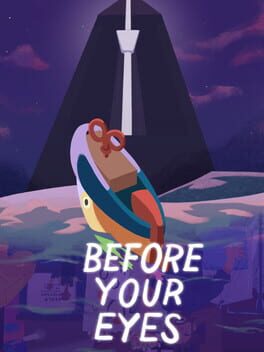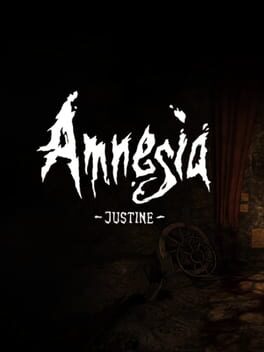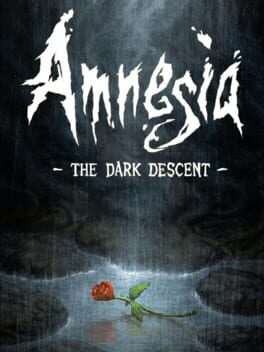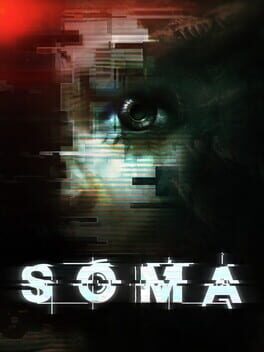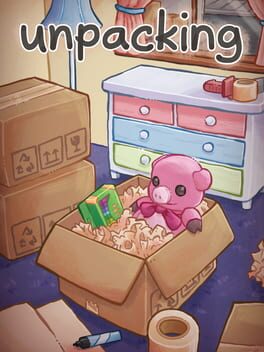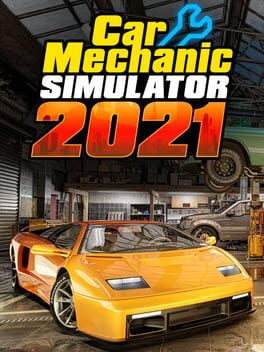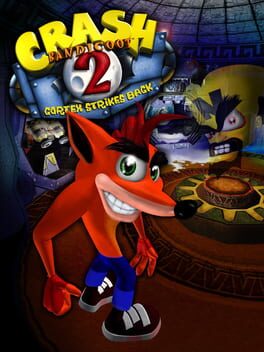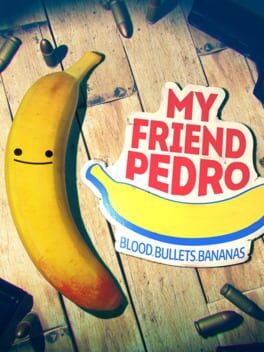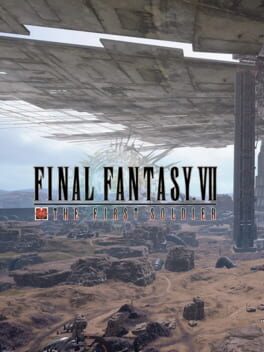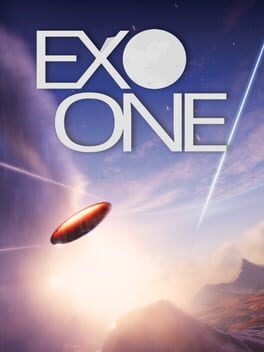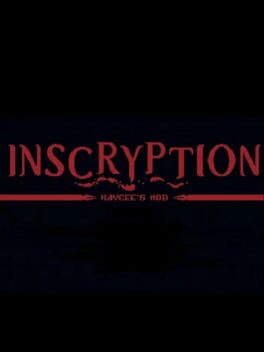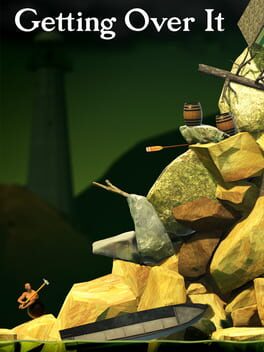Jackho
2021
Nearly got through with a dry pair of eyes while dismissing it as predictable til the last few scenes managed to get me. Much better than most of the sad lo-fi indie and memento mori games out there.
It was a pain in the ass on a technical level though, constant fighting with the blink detection and then every time it started to work reliably it crashed, three times in my playthrough. Speaks to the quality of writing and VA that I'm only docking it one star for that.
It was a pain in the ass on a technical level though, constant fighting with the blink detection and then every time it started to work reliably it crashed, three times in my playthrough. Speaks to the quality of writing and VA that I'm only docking it one star for that.
2011
Sort of a precursor to today's Itch.io horror microgames. Too slight to leave much impact despite being a cool idea that's theoretically well-suited to its short runtime, and includes one of the worst, most esoteric puzzles I've encountered in a while. The moral choices, supposed to be a test of character, are so obtuse it's hard to even parse them as choices on the first run let alone for them to feel meaningful.
On the other hand frantically opening a door and then locking it again while something closes in on you is the best part of these games and there's an extended, multi-room instance of that in here which is further heightened by the permadeath. Worth a spin if you have the collection.
On the other hand frantically opening a door and then locking it again while something closes in on you is the best part of these games and there's an extended, multi-room instance of that in here which is further heightened by the permadeath. Worth a spin if you have the collection.
The game that launched a dozen millionaire YouTuber careers, helped usher the golden/cursed age of the let's play and marked a watershed moment in horror game design. Yet when The Dark Descent was busy being extolled as the scariest game evar I was that faint, squeaky "nuh-uh!" at the back of the congregation.
Despite being an avid fan of both horror and adventure games and, as a result, being an early fan of Frictional Games via the Penumbra series, I'd always been lukewarm on Amnesia and somewhat baffled by its monumental mainstream success. Besides not being scary (as I'd claim back then) it was just annoying to play through, with its sanity bar, incessant distortion effects, constant voiceover monologues that make you walk through molasses while listening, endless flashes to bright white in a game expected to be played in the dark, oil that burns out in 30 seconds and a character deathly allergic to any room with lighting below 2,000 lumens. I felt the horror gameplay was not only overly basic but bogged down with all this useless annoyance, as if they saw Far Cry 2’s infamous perpetually jamming guns and thought that’s what our whole game should be.
Well 14 years later, removed from the hype and coming off a newfound (or perhaps rediscovered) respect for this team off the back of SOMA and The Bunker I can see I was for the most part missing the forest for the trees on this. Those white screen flashes and molasses-walk voiceovers can still buzz off and the scripted distortions do drag on a bit now and then but mostly I was just too familiar with Penumbra and had grown bored with Frictional's tricks at precisely the same moment the internet got obsessed with them. With Penumbra now fading from my old man memory I can see now there’s a lot of good here that I'd been taking for granted.
A sanity bar still irks me a bit in principle because it feels like the game trying to tell me my own reaction, but not being able to look directly at enemies and mechanically making the player actually afraid of the dark itself are both genius, and having to balance two competing stats in trying not to go crazy and trying not to die adds a perceived weight to one's moment-to-moment decision making throughout. The lantern oil is particularly stingy at first but if you're even a little conservative you'll soon have more oil than you'll need, so that it's not annoying, yet very rarely have enough at once to feel comfortable. Not to mention trying in vain to keep a dwindling flame alive in the depths of darkness is a powerful visual motif in line with the sanity theme and the writing's Lovecraftian ambitions.
An organically induced fear of the dark and the management of light were near-perfected in last year's brilliant and relentlessly oppressive Amnesia: The Bunker, but we have to walk before we can run and The Dark Descent lays a solid groundwork before they were brave enough to really get sadistic on a gamer. Perhaps more notably it's Amnesia's first sequel, A Machine For Pigs, that made me rethink the light management most, in that one you can use your light indefinitely with no consequence and ironically that abundance makes it feel like something is sorely missing. In that game you never feel like you're in real danger, where here (and even far moreso in The Bunker) it never feels like you're really safe. For immersive horror that's nothing short of a triumph.
Most of all though I realize now that I was wrong about one thing above all else, and now I'm no longer too cool to admit the truth: The Dark Descent is scary. Hugging a wall, moving slowly through the dark, thinking you're really going to make it, hearing that music cue, making a break for it and frantically trying to open a door, close it again and block it on the other side is still some of the most exhilarating moments any game can offer. Frictional's beautifully wonky physics engine ensures that opening drawers never gets old and that doors will always max out your heart rate during a chase. When you're a bit fatigued with no-combat 'pursuer' enemy designs it's good to return to the masters and be reminded why it got so popular in the first place.
Puzzles mostly strike a good balance in turning your brain on enough to get the dopamine flowing without being likely to get you stuck (though I did once resort to the patented adventure game tradition of just trying every item on every other item - a jar on a string, of course, why didn't I think of that? Also that pipe wall puzzle was fucking stupid), the writing is pretty good throughout - enough to make me actually eager to be picking up another note - and the villain has possibly the most epic voice evar.
There's an abundance of muddy dungeon maze environments but somehow there's still enough variance and novelty in the puzzles and monster encounters to keep this descent compelling even 14 years, many sequels and countless imitators later. My return to Castle Brennenburg was a fruitful one beyond my expectations. It turns out sometimes it's not everyone else who was wrong, sometimes it just takes another 500 games in the log to begin to understand the genius you'd previously dismissed.
Despite being an avid fan of both horror and adventure games and, as a result, being an early fan of Frictional Games via the Penumbra series, I'd always been lukewarm on Amnesia and somewhat baffled by its monumental mainstream success. Besides not being scary (as I'd claim back then) it was just annoying to play through, with its sanity bar, incessant distortion effects, constant voiceover monologues that make you walk through molasses while listening, endless flashes to bright white in a game expected to be played in the dark, oil that burns out in 30 seconds and a character deathly allergic to any room with lighting below 2,000 lumens. I felt the horror gameplay was not only overly basic but bogged down with all this useless annoyance, as if they saw Far Cry 2’s infamous perpetually jamming guns and thought that’s what our whole game should be.
Well 14 years later, removed from the hype and coming off a newfound (or perhaps rediscovered) respect for this team off the back of SOMA and The Bunker I can see I was for the most part missing the forest for the trees on this. Those white screen flashes and molasses-walk voiceovers can still buzz off and the scripted distortions do drag on a bit now and then but mostly I was just too familiar with Penumbra and had grown bored with Frictional's tricks at precisely the same moment the internet got obsessed with them. With Penumbra now fading from my old man memory I can see now there’s a lot of good here that I'd been taking for granted.
A sanity bar still irks me a bit in principle because it feels like the game trying to tell me my own reaction, but not being able to look directly at enemies and mechanically making the player actually afraid of the dark itself are both genius, and having to balance two competing stats in trying not to go crazy and trying not to die adds a perceived weight to one's moment-to-moment decision making throughout. The lantern oil is particularly stingy at first but if you're even a little conservative you'll soon have more oil than you'll need, so that it's not annoying, yet very rarely have enough at once to feel comfortable. Not to mention trying in vain to keep a dwindling flame alive in the depths of darkness is a powerful visual motif in line with the sanity theme and the writing's Lovecraftian ambitions.
An organically induced fear of the dark and the management of light were near-perfected in last year's brilliant and relentlessly oppressive Amnesia: The Bunker, but we have to walk before we can run and The Dark Descent lays a solid groundwork before they were brave enough to really get sadistic on a gamer. Perhaps more notably it's Amnesia's first sequel, A Machine For Pigs, that made me rethink the light management most, in that one you can use your light indefinitely with no consequence and ironically that abundance makes it feel like something is sorely missing. In that game you never feel like you're in real danger, where here (and even far moreso in The Bunker) it never feels like you're really safe. For immersive horror that's nothing short of a triumph.
Most of all though I realize now that I was wrong about one thing above all else, and now I'm no longer too cool to admit the truth: The Dark Descent is scary. Hugging a wall, moving slowly through the dark, thinking you're really going to make it, hearing that music cue, making a break for it and frantically trying to open a door, close it again and block it on the other side is still some of the most exhilarating moments any game can offer. Frictional's beautifully wonky physics engine ensures that opening drawers never gets old and that doors will always max out your heart rate during a chase. When you're a bit fatigued with no-combat 'pursuer' enemy designs it's good to return to the masters and be reminded why it got so popular in the first place.
Puzzles mostly strike a good balance in turning your brain on enough to get the dopamine flowing without being likely to get you stuck (though I did once resort to the patented adventure game tradition of just trying every item on every other item - a jar on a string, of course, why didn't I think of that? Also that pipe wall puzzle was fucking stupid), the writing is pretty good throughout - enough to make me actually eager to be picking up another note - and the villain has possibly the most epic voice evar.
There's an abundance of muddy dungeon maze environments but somehow there's still enough variance and novelty in the puzzles and monster encounters to keep this descent compelling even 14 years, many sequels and countless imitators later. My return to Castle Brennenburg was a fruitful one beyond my expectations. It turns out sometimes it's not everyone else who was wrong, sometimes it just takes another 500 games in the log to begin to understand the genius you'd previously dismissed.
2015
This review contains spoilers
Loses a half star for station Alpha feeling underdeveloped given its build-up and climactic placement in the story. It’s taken me nearly a decade to get around to it but SOMA is undoubtedly Frictional Games’ highest artistic peak and a genre high point for sci-fi, horror and adventure games.
It’s a shame they only started experimenting with traditional survival horror guns and inventory management in last year’s Amnesia: The Bunker, which I consider a superior game mechanically and would argue virtually proved that being able to fight back makes horror games better. The same avoider gameplay they've been doing since Penumbra works fine here, but this story and setting combined with some of The Bunker’s mechanical cleverness would have instantly made it into my top 5.
It’s a shame they only started experimenting with traditional survival horror guns and inventory management in last year’s Amnesia: The Bunker, which I consider a superior game mechanically and would argue virtually proved that being able to fight back makes horror games better. The same avoider gameplay they've been doing since Penumbra works fine here, but this story and setting combined with some of The Bunker’s mechanical cleverness would have instantly made it into my top 5.
2019
Sublime indie platforming. Beautifully crunchy "Wind Waker if he PS1" aesthetics, excellent game feel and some ingeniously simple mechanics, with your main collectible also doubling as a permanent buff to your maneuverability. Movement and exploration are continually the method, the goal and the reward.
Also very pleasantly chill. There's enough moments to get the noggin' joggin' and minimum reused concepts keep it fresh, but the whole thing is framed with perpetually minimal stakes to keep it relaxed. Sure I may have felt the blood pressure kick in momentarily with that volleyball game and the boat challenge but they turned out to only require a couple tries each. Dudism's tenet of "take it easy, man" was evidently a design principle on here.
Only problem I found is that navigating the island as a whole, rather than a specific area of it, is a bit of a nightmare. The fixed yet continually rotating camera is mad disorienting. Though I'm not sure I'd change it as this also makes the game world feel far bigger than it really is and makes seamless areas feel more like distinct levels than you usually get in a 3D collecty platformer. That, and some of these characters (though the writing is unusually tolerable for this "whatever bro" indie vibe, even got a few laughs from me) are a bit overly verbose and the jump/fly button is also the talk button - many, many times I tried to move away from a character only to get locked into their entire life story. Also the absurd amount of fish needed for the fishing achievement, I wont chalk that up as a flaw but the all-consuming obsession game designers have with implementing fishing continues to mystify me.
I won't say it's too short but it's the first game in a while that I 100%'d and then wished there was more to do, after I'd finished I spent a while just flying around enjoying the feel of it. The more I think about it the harder it is to fault. Something like the platonic ideal of a game pass game, too, though I can see myself buying it just to support the dev further.
Also very pleasantly chill. There's enough moments to get the noggin' joggin' and minimum reused concepts keep it fresh, but the whole thing is framed with perpetually minimal stakes to keep it relaxed. Sure I may have felt the blood pressure kick in momentarily with that volleyball game and the boat challenge but they turned out to only require a couple tries each. Dudism's tenet of "take it easy, man" was evidently a design principle on here.
Only problem I found is that navigating the island as a whole, rather than a specific area of it, is a bit of a nightmare. The fixed yet continually rotating camera is mad disorienting. Though I'm not sure I'd change it as this also makes the game world feel far bigger than it really is and makes seamless areas feel more like distinct levels than you usually get in a 3D collecty platformer. That, and some of these characters (though the writing is unusually tolerable for this "whatever bro" indie vibe, even got a few laughs from me) are a bit overly verbose and the jump/fly button is also the talk button - many, many times I tried to move away from a character only to get locked into their entire life story. Also the absurd amount of fish needed for the fishing achievement, I wont chalk that up as a flaw but the all-consuming obsession game designers have with implementing fishing continues to mystify me.
I won't say it's too short but it's the first game in a while that I 100%'d and then wished there was more to do, after I'd finished I spent a while just flying around enjoying the feel of it. The more I think about it the harder it is to fault. Something like the platonic ideal of a game pass game, too, though I can see myself buying it just to support the dev further.
2021
Achieves new heights in the field of synthesizing "boring enough to listen to podcasts" with "compelling enough to make you keep playing." Just one more box / room / house I say when it's already past midnight, and before I know it they've snuck in just enough plot and character to actually get me invested in a person I only know through the mutual contacts of a GameCube and a plushie collection. Plus anything that opts for a 2000s setting is a win to me.
Wish it was longer, though. There is more story than I expected but it ends rather abruptly at an arbitrary point in their life, or I suppose rather the only victorious/uplifting point while remaining toothlessly accessible. I expected to be here for the whole journey, the rise and the fall. Fair enough, it's a twee indie game, but when I think of a life story told through accumulated tchotchkes, the transient sentimental value of things destined for the landfill, 'happily ever after' is far enough away to almost feel disingenuous.
Still it's a nice time that delivered more substance than I expected, and I really ought to count my blessings that yet another indie game isn't trying to be 'That Dragon, Cancer' for once.
Wish it was longer, though. There is more story than I expected but it ends rather abruptly at an arbitrary point in their life, or I suppose rather the only victorious/uplifting point while remaining toothlessly accessible. I expected to be here for the whole journey, the rise and the fall. Fair enough, it's a twee indie game, but when I think of a life story told through accumulated tchotchkes, the transient sentimental value of things destined for the landfill, 'happily ever after' is far enough away to almost feel disingenuous.
Still it's a nice time that delivered more substance than I expected, and I really ought to count my blessings that yet another indie game isn't trying to be 'That Dragon, Cancer' for once.
Like all good simulator games it feels hopelessly overwhelming and inaccessible at first and ten minutes later it's settled into boring routine so you can safely stick a podcast on. This one's particularly checklisty which remains fundamentally satisfying but is notably even less stimulating than other job sims. You can't really screw things up - it highlights wherever you've removed parts so you can't forget, and you can't place the wrong parts or in the wrong order. What challenge remains is in playing trial-and-error engine detective and figuring out where and what the fuck an ignition coil is, as you get no instructions for most repairs.
For being the fifth instalment in this series it still feels barren and unpolished. Cars kept spawning inside eachother and you have radial menus within menus within menus to do everything for some extra tedium. Forget context sensitivity, this game forgets that controllers have more than one button these days. Outside the garage there's a vague impression of additional features - I tried a test track that's 30 seconds long with a minute of loading either side - but most are walled off until you level up significantly which by my playtime would seem to require many hours and several dozen car repairs to reach. I think I'm good, game.
For all its faults though there's certainly a zen appeal and I did catch myself thinking "just one more car," multiple cars in a row, and its kind of neat seeing dozens of unlicensed knock-offs of recognisable vehicles replicated with interiors and all.
For being the fifth instalment in this series it still feels barren and unpolished. Cars kept spawning inside eachother and you have radial menus within menus within menus to do everything for some extra tedium. Forget context sensitivity, this game forgets that controllers have more than one button these days. Outside the garage there's a vague impression of additional features - I tried a test track that's 30 seconds long with a minute of loading either side - but most are walled off until you level up significantly which by my playtime would seem to require many hours and several dozen car repairs to reach. I think I'm good, game.
For all its faults though there's certainly a zen appeal and I did catch myself thinking "just one more car," multiple cars in a row, and its kind of neat seeing dozens of unlicensed knock-offs of recognisable vehicles replicated with interiors and all.
One of the visual peaks of the 5th gen and still one of my favorite looking games. There's something aesthetically evergreen in the design and color choices here even after two decades of fidelity improvements leave it looking crunchy.
The first inklings of the technical perfectionism that would come to define Naughty Dog are detectable here. A refined second draft that, at least to me, stands clearly head and shoulders above the other two entries in the trilogy, the first one being significantly rougher in its graphics, controls and level design and the third game getting too bogged down in gimmick levels and - though granted this is a particularly subjective criticism - introducing the horrific bullshit of time trials being necessary for 100%. They have their precursor here in two level-specific challenges that add some variety, rather than an exhausting extra parameter stretched across the entire game.
This one is almost air tight. The controls still feel perfect and almost every level is laser focused straight forward platforming, pared down compared to its more free-roaming contemporaries but hitting an intersection between simplicity and polish that makes it significantly nicer to return to today. The variety of terrain, obstacle layouts and enemy designs squeeze every last drop out of Crash's move set - expanded here quite ingeniously with a slide that doubles as an attack and can lead into a high jump. The jetpack levels are questionable but brief and inoffensive, and the only other gimmicks - the polar bear, jet board, chase levels - are bangers, providing bursts of varied challenge rather than totally irrelevant and often wonky mechanics to be endured ala Crash 3's plane or bike racing levels.
The difficulty has been refined as well, levels are segmented with more checkpoints, with most of the harder bits being in the bonus levels that don't cost lives. It's subjective, of course, but this more forgiving approach after the first game's occasionally brutal difficulty to me indicates a matured team who know they're on top of the platform with nothing to prove. Plus when you do die you're treated to one of a couple dozen unique death animations, one of the more showy indicators of an increased attention to detail.
This does make a few sadistic choices stand out in a weird way - by far the most egregious is a box that's outside of your visible screen with no indication that its there. In other cases its not just the level of difficulty but requirements being esoteric enough that you might not clock them, like having to play through levels without dying and then backtrack to branch off into a harder route, sometimes against the camera. The most difficult parts feel like the game's design folding back on itself, like you're doing something that surely couldn't have been the intended method.
On the other hand I can't hate it because nothing has ever tickled the core of my gamer amygdala like finding a secret exit in Crash 2 and its a product of the same design mindset. No other game secrets capture the feeling that you've genuinely trespassed outside the normal and into the fringe as much as Crash 2's secret warp room with its shadowy, liminal levels, a feeling further emphasised by the room not being easily accessible even after its discovery, you can only get in through another obscure backdoor. Its magic.
The only thing that really bothers me (besides that one box) are the odd times when an alternate route platforms brings you back further along than when you branched off, making it unclear if you need to backtrack for boxes. That, and it's too short and too addictive. Every time I get 100% I have to start it over again.
The first inklings of the technical perfectionism that would come to define Naughty Dog are detectable here. A refined second draft that, at least to me, stands clearly head and shoulders above the other two entries in the trilogy, the first one being significantly rougher in its graphics, controls and level design and the third game getting too bogged down in gimmick levels and - though granted this is a particularly subjective criticism - introducing the horrific bullshit of time trials being necessary for 100%. They have their precursor here in two level-specific challenges that add some variety, rather than an exhausting extra parameter stretched across the entire game.
This one is almost air tight. The controls still feel perfect and almost every level is laser focused straight forward platforming, pared down compared to its more free-roaming contemporaries but hitting an intersection between simplicity and polish that makes it significantly nicer to return to today. The variety of terrain, obstacle layouts and enemy designs squeeze every last drop out of Crash's move set - expanded here quite ingeniously with a slide that doubles as an attack and can lead into a high jump. The jetpack levels are questionable but brief and inoffensive, and the only other gimmicks - the polar bear, jet board, chase levels - are bangers, providing bursts of varied challenge rather than totally irrelevant and often wonky mechanics to be endured ala Crash 3's plane or bike racing levels.
The difficulty has been refined as well, levels are segmented with more checkpoints, with most of the harder bits being in the bonus levels that don't cost lives. It's subjective, of course, but this more forgiving approach after the first game's occasionally brutal difficulty to me indicates a matured team who know they're on top of the platform with nothing to prove. Plus when you do die you're treated to one of a couple dozen unique death animations, one of the more showy indicators of an increased attention to detail.
This does make a few sadistic choices stand out in a weird way - by far the most egregious is a box that's outside of your visible screen with no indication that its there. In other cases its not just the level of difficulty but requirements being esoteric enough that you might not clock them, like having to play through levels without dying and then backtrack to branch off into a harder route, sometimes against the camera. The most difficult parts feel like the game's design folding back on itself, like you're doing something that surely couldn't have been the intended method.
On the other hand I can't hate it because nothing has ever tickled the core of my gamer amygdala like finding a secret exit in Crash 2 and its a product of the same design mindset. No other game secrets capture the feeling that you've genuinely trespassed outside the normal and into the fringe as much as Crash 2's secret warp room with its shadowy, liminal levels, a feeling further emphasised by the room not being easily accessible even after its discovery, you can only get in through another obscure backdoor. Its magic.
The only thing that really bothers me (besides that one box) are the odd times when an alternate route platforms brings you back further along than when you branched off, making it unclear if you need to backtrack for boxes. That, and it's too short and too addictive. Every time I get 100% I have to start it over again.
2019
Some of the most pleasurable mindless violence this side of Hotline Miami. My Friend Pedro is built on a perfect intersection of simple and satisfying, with levels made to facilitate moments that somehow feel just as cool as they look and never get old.
One moment you're backflipping off a skateboard and through a window in bullet time before taking out two guys at once by firing your dual pistols in different directions, next you're kicking a frying pan across the room then ricocheting a bullet off it in mid air to get the guy hiding behind cover - all done organically with real-time physics and underscored by a hammering EDM soundtrack. It's the kind of audio-visual stimulus overload our ape cerebellums are built to seek and get instantly fried by. Every gun feels great too.
Sure the dice are a bit weighted in favor of raditude - you know, for example, that richochets will almost always land in your favor while blasting sewer-dwelling mutant gamers, but this just enables you to blaze through with the exaggerated swagger of a John Wick.
It's the only game in recent memory that I've wished was longer, though it does get a little more uneven as it goes on. A few levels forego combat altogether, opting for puzzle-platforming. While these bits are pleasantly retro in design (possibly owing to its Flash game origins, also something that bleeds through in its enjoyably stupid plot) and I detected some heavy Oddworld influence in the more intense sequences, at best they feel like interludes between the real gameplay and will have one itching to get back to the fireworks factory.
The other fumble for me are the S ranks, the requirements being so brutal it squeezes most of the fun and just became frustrating. You can rush through a level taking out every enemy in a perfectly strung combo chain and still only land an A-rank. The time requirements are so strict that every little physics snag or a moving platform being a micrometer farther away than convenient ruins your run and means you're punished for use of bullet time, disabling probably the game's single funnest element. Some lunatics surely loved the trial-and-error perfectionism but I gave up on S-ranking most levels quickly for fear of ripping out some hair.
That's a minor gripe overall though and I'll no doubt replay through these levels many more times regardless of what rank I get. Victor Ågren, if you're reading this please make a sequel and inject it directly into my eyeballs.
One moment you're backflipping off a skateboard and through a window in bullet time before taking out two guys at once by firing your dual pistols in different directions, next you're kicking a frying pan across the room then ricocheting a bullet off it in mid air to get the guy hiding behind cover - all done organically with real-time physics and underscored by a hammering EDM soundtrack. It's the kind of audio-visual stimulus overload our ape cerebellums are built to seek and get instantly fried by. Every gun feels great too.
Sure the dice are a bit weighted in favor of raditude - you know, for example, that richochets will almost always land in your favor while blasting sewer-dwelling mutant gamers, but this just enables you to blaze through with the exaggerated swagger of a John Wick.
It's the only game in recent memory that I've wished was longer, though it does get a little more uneven as it goes on. A few levels forego combat altogether, opting for puzzle-platforming. While these bits are pleasantly retro in design (possibly owing to its Flash game origins, also something that bleeds through in its enjoyably stupid plot) and I detected some heavy Oddworld influence in the more intense sequences, at best they feel like interludes between the real gameplay and will have one itching to get back to the fireworks factory.
The other fumble for me are the S ranks, the requirements being so brutal it squeezes most of the fun and just became frustrating. You can rush through a level taking out every enemy in a perfectly strung combo chain and still only land an A-rank. The time requirements are so strict that every little physics snag or a moving platform being a micrometer farther away than convenient ruins your run and means you're punished for use of bullet time, disabling probably the game's single funnest element. Some lunatics surely loved the trial-and-error perfectionism but I gave up on S-ranking most levels quickly for fear of ripping out some hair.
That's a minor gripe overall though and I'll no doubt replay through these levels many more times regardless of what rank I get. Victor Ågren, if you're reading this please make a sequel and inject it directly into my eyeballs.
2021
Here Lies Final Fantasy VII First Soldier.
November 17, 2021 - January 11, 2023
It wasn't the first, best or most polished Fortnite/PUBG clone on the market, but in its short life it managed to get Yuji Naka arrested again and made for some dank nights with the boyz hoarding those chicken dinners, as apparently everyone else on the server was too Japanese or too 11-years-old to aim properly. What more can you ask from a greed-fueled mobile spinoff of a beloved childhood favorite?
It's earned its spot up there next to Gunpei Yokoi, PT and Flappy Bird in that great big gamer skybox. Farewell.
November 17, 2021 - January 11, 2023
It wasn't the first, best or most polished Fortnite/PUBG clone on the market, but in its short life it managed to get Yuji Naka arrested again and made for some dank nights with the boyz hoarding those chicken dinners, as apparently everyone else on the server was too Japanese or too 11-years-old to aim properly. What more can you ask from a greed-fueled mobile spinoff of a beloved childhood favorite?
It's earned its spot up there next to Gunpei Yokoi, PT and Flappy Bird in that great big gamer skybox. Farewell.
2021
While Act 1 is everyone's favorite part of Inscryption the actual card game mechanics were, at least for me, one of the smallest parts of that. The cards are good throughout, what elevates act 1 is the immense sense of mystery and intrigue, the stoat and stinkbug, clues from previous victims, the feeling that even in your deaths you're building toward a plan to outsmart your captor, stakes being so high that your dude is willing to rip out a tooth for one extra point.
Turns out when you strip all that down and amp up the RNG/roguelike stuff it makes for a significantly less captivating experience. By the end of the core game the story contains practically zero of what initially hooked me, so even though there's probably more lore to uncover in here I'm not really interested in hearing it. Can't help but feel the existence of this narratively undermines the main game a little, too.
It's still good, and I'll probably return to it often enough, but I have to massively disagree with those claiming this is the better version or what the core game should be. On paper, sure, it's the universally-agreed best part of game expanded, but missing all the elements that made that part feel so fresh, made it feel more than just an addictive card battler.
Turns out when you strip all that down and amp up the RNG/roguelike stuff it makes for a significantly less captivating experience. By the end of the core game the story contains practically zero of what initially hooked me, so even though there's probably more lore to uncover in here I'm not really interested in hearing it. Can't help but feel the existence of this narratively undermines the main game a little, too.
It's still good, and I'll probably return to it often enough, but I have to massively disagree with those claiming this is the better version or what the core game should be. On paper, sure, it's the universally-agreed best part of game expanded, but missing all the elements that made that part feel so fresh, made it feel more than just an addictive card battler.
2021
What if Yugioh except it's the Blair Witch Project? And I don't just mean Yugioh the card game but Yugioh the ridiculous anime that wrings a high stakes plot out of that card game.
Inscryption is able to fully embrace being a single-player experience, with asymmetrical rules, opponents that just make up new ones on the fly and a meta-game of outsmarting the enemy both on and off the board. To win you ultimately have to decide how you're going to utterly break the game to beat the odds stacked against you.
As everyone else points out, the biggest sin is that the earliest part is easily the best. It's not the card gameplay, which I found highly addictive throughout and gets nicely injected with new mechanics as it goes on, but an expanding narrative context that causes a loss in momentum. Besides some cool fourth wall breaks (should have guessed this was the Pony Island dev) there's little to keep one hooked narratively, with radically diminishing stakes and a meta story that switches gears from fresh and genuinely unnerving to really silly and riddled with cliches. On the other hand they whip out a literal duel disk at the last second, so I can't hate.
It's still excellent and delivers on what I've wanted from digital card games forever, really the only problem is that the first third ignites far more narrative intrigue than the late game is capable of delivering on.
Inscryption is able to fully embrace being a single-player experience, with asymmetrical rules, opponents that just make up new ones on the fly and a meta-game of outsmarting the enemy both on and off the board. To win you ultimately have to decide how you're going to utterly break the game to beat the odds stacked against you.
As everyone else points out, the biggest sin is that the earliest part is easily the best. It's not the card gameplay, which I found highly addictive throughout and gets nicely injected with new mechanics as it goes on, but an expanding narrative context that causes a loss in momentum. Besides some cool fourth wall breaks (should have guessed this was the Pony Island dev) there's little to keep one hooked narratively, with radically diminishing stakes and a meta story that switches gears from fresh and genuinely unnerving to really silly and riddled with cliches. On the other hand they whip out a literal duel disk at the last second, so I can't hate.
It's still excellent and delivers on what I've wanted from digital card games forever, really the only problem is that the first third ignites far more narrative intrigue than the late game is capable of delivering on.
Easy to dismiss this as a shallow rage-game with some Stanley Parable esque musing laid over the top, but crucially unlike Stanley the philosophy here is conveyed mechanically and it would work entirely without the voiceover, which only dips in occasionally rather than dominating the experience.
The VO is there to initially convey 1. this game has more thought behind its design than it may first appear and 2. that it is making a point (so power-on that noodle). And then 3. to gently remind you that it's about perseverance, patience, taking a deep breath and going again whenever it's detected you might be particularly likely to send your keyboard through a wall. It doesn't quite say so outright, but the inspirational quotes and music choices, while often funny, come across more as a statement of empathy than ridicule.
It's not trying to make you mad, it's trying to show you that frustration ain't shit, the path of good humor is available even when you have every reason to let anger take the wheel. Zen by way of torture: evoke the negative emotion so you can master it. Mr. Foddy is no doubt going to pop into my mind with some line the next time I have a real-world blunder. And it's genuinely a better take on gamified mindfulness than any of the more explicit attempts out there. It's the Dark Souls (take a drink) phenomenon stripped down to its purest essence - the cycle of "are you shitting me" -> "wait maybe I can do this" -> "I WILL do this" -> repeat.
Barely made it past the devil's chimney after a trillion failures, and fell right back to the start shortly after. I'll consider myself sufficiently tortured for now but will no doubt be returning sooner or later to bang my head on this mountain and remind myself that I too contain a share of man's indominable secret ability to always try, try again.
The VO is there to initially convey 1. this game has more thought behind its design than it may first appear and 2. that it is making a point (so power-on that noodle). And then 3. to gently remind you that it's about perseverance, patience, taking a deep breath and going again whenever it's detected you might be particularly likely to send your keyboard through a wall. It doesn't quite say so outright, but the inspirational quotes and music choices, while often funny, come across more as a statement of empathy than ridicule.
It's not trying to make you mad, it's trying to show you that frustration ain't shit, the path of good humor is available even when you have every reason to let anger take the wheel. Zen by way of torture: evoke the negative emotion so you can master it. Mr. Foddy is no doubt going to pop into my mind with some line the next time I have a real-world blunder. And it's genuinely a better take on gamified mindfulness than any of the more explicit attempts out there. It's the Dark Souls (take a drink) phenomenon stripped down to its purest essence - the cycle of "are you shitting me" -> "wait maybe I can do this" -> "I WILL do this" -> repeat.
Barely made it past the devil's chimney after a trillion failures, and fell right back to the start shortly after. I'll consider myself sufficiently tortured for now but will no doubt be returning sooner or later to bang my head on this mountain and remind myself that I too contain a share of man's indominable secret ability to always try, try again.
